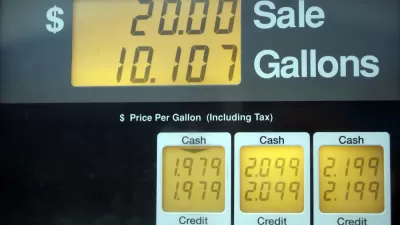Don't ever accuse Rep. Earl Blumenauer of not thinking big. Accompanying his gas tax increase bill, he has proposed a bill to study ways to charge drivers by the miles they drive. One takes care of the funding problem now, the other in the future.
"Rep. Earl Blumenauer (D-Ore.) on Tuesday reintroduced legislation that would require the government to study the most practical ways of taxing drivers based on how far they drive, in order to help fund federal highway programs," writes Pete Kasperowicz.
This legislation is in addition to the gas tax increase bill we posted on Tuesday.
HR 3638, the 'Road User Fee Pilot Project Act', "is similar to an idea he proposed in a bill last year [also posted here] which called on the Treasury Department to study the viability of a vehicle miles traveled (VMT) tax [or VMT fee]," writes Kasperowicz.
"As we extend the gas tax, we must also think about how to replace it with something more sustainable," Blumenauer said Tuesday. "The best candidate would be the vehicle mile traveled fee being explored by pilot projects in Oregon and implemented there on a voluntary basis next year."
Oregon completed two pilot projects [see final report (PDF)] before passing legislation last July that will implement the nation's first VMT fee program, presumably in the summer of 2015, though, as Congressman Blumenauer stated, it is voluntary and limited to 5,000 vehicles.
The congressman held his press conference on Wednesday for "H.R. 3636: To amend the Internal Revenue Code of 1986 to increase the excise tax on gasoline, diesel, and kerosene...". He did not present H.R. 3638, the VMT Fee study bill, with it. One user fee was enough. As we have posted here on many occasions, there is formidable political opposition to increasing user fees of any kind.
FULL STORY: Dem proposes taxing drivers by the mile

Planetizen Federal Action Tracker
A weekly monitor of how Trump’s orders and actions are impacting planners and planning in America.

Maui's Vacation Rental Debate Turns Ugly
Verbal attacks, misinformation campaigns and fistfights plague a high-stakes debate to convert thousands of vacation rentals into long-term housing.

Restaurant Patios Were a Pandemic Win — Why Were They so Hard to Keep?
Social distancing requirements and changes in travel patterns prompted cities to pilot new uses for street and sidewalk space. Then it got complicated.

In California Battle of Housing vs. Environment, Housing Just Won
A new state law significantly limits the power of CEQA, an environmental review law that served as a powerful tool for blocking new development.

Boulder Eliminates Parking Minimums Citywide
Officials estimate the cost of building a single underground parking space at up to $100,000.

Orange County, Florida Adopts Largest US “Sprawl Repair” Code
The ‘Orange Code’ seeks to rectify decades of sprawl-inducing, car-oriented development.
Urban Design for Planners 1: Software Tools
This six-course series explores essential urban design concepts using open source software and equips planners with the tools they need to participate fully in the urban design process.
Planning for Universal Design
Learn the tools for implementing Universal Design in planning regulations.
Heyer Gruel & Associates PA
JM Goldson LLC
Custer County Colorado
City of Camden Redevelopment Agency
City of Astoria
Transportation Research & Education Center (TREC) at Portland State University
Jefferson Parish Government
Camden Redevelopment Agency
City of Claremont



























